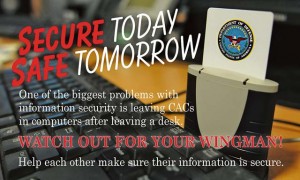Being an Airman comes with a lot of responsibility, and none more vital than information security. Being vigilant 24/7 can be difficult, but becoming complacent and leaving a common access card in a computer can be harmful for everyone on the network.
Tech. Sgt. William Reigle, 86th Communications Squadron alternate wing information assurance manager, said one of the leading problems with information security in the Air Force is CACs being left in computers while the owner is not in attendance.

“People who have access to the network may accidentally leave their CAC in their computer,” Reigle said. “What some people may not know is that doing this is a huge risk.”
Information on the network is important to the security of military members and civilians working for the Department of Defense. Military networks contain personal identifying information, material about current operations and even personal finances.
“Information on the network can be hacked by anyone with a computer,” said Senior Airman Dana Wollschlager, 86th CS wing IA technician. “Everyone who has a network computer is at risk but if you practice good IA you can prevent some problems from happening.”
One way to practice better IA is to get education from the IA officer for your unit. IAOs are part of every unit and a valuable resource for Airmen’s information protection.
“If someone doesn’t know or understand the vulnerabilities of leaving their information unsecure, they can go to their IAO,” Reigle said. “IAOs can give out the Ramstein Air Base IA quick tip card that has IA information on it. We also send out weekly emails to the IAOs with updated information about IA.”
With newer technology and more information on the network, not being protected can make it easier to be hacked. Not keeping information secure can possibly be detrimental to the network.
“A risk by one is accepted by all,” Reigle said.
It is always a good idea to follow the local and Air Force policies for IA. Taking more time in the day to make sure your information is safe is worth it.
“If you find problems with your security, think there is a virus on your computer, receive an untrustworthy email or think you are at risk, contact your IAO or the wing IA,” Wollschlager said. “Policies exist for a reason. Follow them and you should have very little problems.”
For more information, contact your IAO or call the wing IA at 480-3438 or 06371-47-3438.


